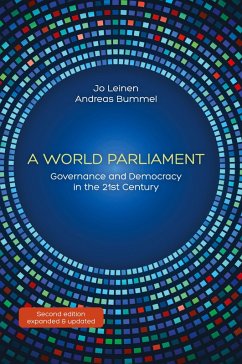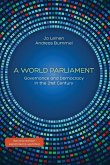For the first time in history, all people worldwide are linked together in a shared civilization that spans the entire Earth. Humanity now has a common destiny. Global challenges such as war, poverty, inequality, climate change, and environmental destruction are overwhelming nation-states and today's international institutions. Even the best policies are futile if there are no appropriate political structures in place to implement them. Autocracy and nationalism further undermine global collaboration. But the desire for freedom and change is unabated. Following the emergence of democracy in ancient times and its spread to modern states from the 18th century onwards, a third democratic transformation is imminent: expanding democracy to the global scale. Achieving a peaceful, just and sustainable world requires an evolutionary leap forward. The creation of a democratic world parliament is the centrepiece of this project. This book explores the history, relevance and implementation of this monumental idea. The first part explores the philosophical foundations of cosmopolitanism and a world parliament since ancient times. It fills a gap in the literature by tracing the history of the idea and of the attempts to bring it about from the French Revolution to the present day. In this regard, the book also serves as a comprehensive reference. The second part sets the issue in the context of global challenges such as climate change and planetary boundaries, the management of public goods, the pandemic threat, the stability of the financial system, combating tax evasion, terrorism and organized crime, disarmament, and protecting human rights. The construction of global democracy also plays a decisive role in combating hunger, poverty and inequality and in global water policy. Rapid developments in the fields of bio- and nanotechnology, robotics and artificial intelligence are giving rise to fundamental questions that humanity is not prepared for. There is an overarching narrative that exposes the dysfunctions and deficiencies of the international system. At the same time, the alternative of a democratic world order and its underlying principles is presented with increasing depth. The authors stress that there is a right to democracy that applies not only to the national but also to the global level. Against the backdrop of the power structures of the transnational elite, the book argues for the implementation of a new global social contract . Finally, it outlines the contours of a new global enlightenment as well as the emergence of planetary consciousness and global solidarity. The third part discusses pathways, drivers and conditions for a transition to global democracy and outlines elements of a future global constitution. The second edition reflects significant developments since the original publication, in particular the COVID-19 pandemic, autocratization, and the Russian war of aggression against Ukraine. The second edition incorporates linguistic improvements, updated content, extensive revisions, and additions throughout the book, expanding its size by approximately one fifth.
Hinweis: Dieser Artikel kann nur an eine deutsche Lieferadresse ausgeliefert werden.
Hinweis: Dieser Artikel kann nur an eine deutsche Lieferadresse ausgeliefert werden.








